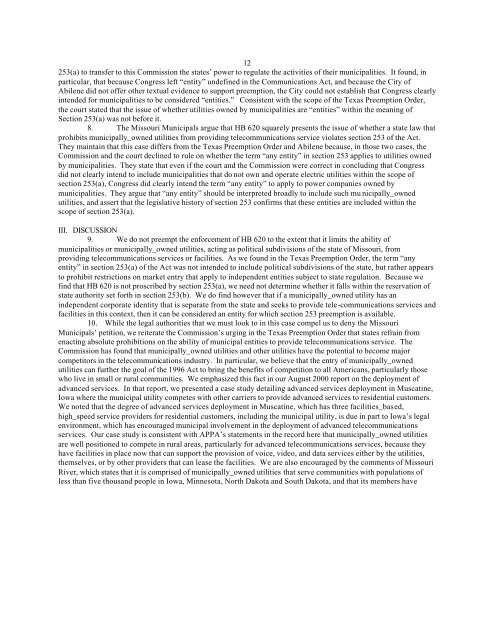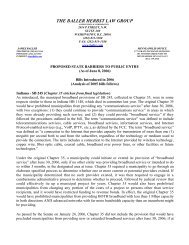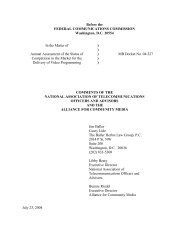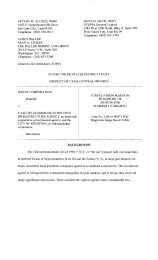Petition for Writ of Certiorari
Petition for Writ of Certiorari
Petition for Writ of Certiorari
Create successful ePaper yourself
Turn your PDF publications into a flip-book with our unique Google optimized e-Paper software.
12<br />
253(a) to transfer to this Commission the states’ power to regulate the activities <strong>of</strong> their municipalities. It found, in<br />
particular, that because Congress left “entity” undefined in the Communications Act, and because the City <strong>of</strong><br />
Abilene did not <strong>of</strong>fer other textual evidence to support preemption, the City could not establish that Congress clearly<br />
intended <strong>for</strong> municipalities to be considered “entities.” Consistent with the scope <strong>of</strong> the Texas Preemption Order,<br />
the court stated that the issue <strong>of</strong> whether utilities owned by municipalities are “entities” within the meaning <strong>of</strong><br />
Section 253(a) was not be<strong>for</strong>e it.<br />
8. The Missouri Municipals argue that HB 620 squarely presents the issue <strong>of</strong> whether a state law that<br />
prohibits municipally_owned utilities from providing telecommunications service violates section 253 <strong>of</strong> the Act.<br />
They maintain that this case differs from the Texas Preemption Order and Abilene because, in those two cases, the<br />
Commission and the court declined to rule on whether the term “any entity” in section 253 applies to utilities owned<br />
by municipalities. They state that even if the court and the Commission were correct in concluding that Congress<br />
did not clearly intend to include municipalities that do not own and operate electric utilities within the scope <strong>of</strong><br />
section 253(a), Congress did clearly intend the term “any entity” to apply to power companies owned by<br />
municipalities. They argue that “any entity” should be interpreted broadly to include such mu nicipally_owned<br />
utilities, and assert that the legislative history <strong>of</strong> section 253 confirms that these entities are included within the<br />
scope <strong>of</strong> section 253(a).<br />
III. DISCUSSION<br />
9. We do not preempt the en<strong>for</strong>cement <strong>of</strong> HB 620 to the extent that it limits the ability <strong>of</strong><br />
municipalities or municipally_owned utilities, acting as political subdivisions <strong>of</strong> the state <strong>of</strong> Missouri, from<br />
providing telecommunications services or facilities. As we found in the Texas Preemption Order, the term “any<br />
entity” in section 253(a) <strong>of</strong> the Act was not intended to include political subdivisions <strong>of</strong> the state, but rather appears<br />
to prohibit restrictions on market entry that apply to independent entities subject to state regulation. Because we<br />
find that HB 620 is not proscribed by section 253(a), we need not determine whether it falls within the reservation <strong>of</strong><br />
state authority set <strong>for</strong>th in section 253(b). We do find however that if a municipally_owned utility has an<br />
independent corporate identity that is separate from the state and seeks to provide tele-communications services and<br />
facilities in this context, then it can be considered an entity <strong>for</strong> which section 253 preemption is available.<br />
10. While the legal authorities that we must look to in this case compel us to deny the Missouri<br />
Municipals’ petition, we reiterate the Commission’s urging in the Texas Preemption Order that states refrain from<br />
enacting absolute prohibitions on the ability <strong>of</strong> municipal entities to provide telecommunications service. The<br />
Commission has found that municipally_owned utilities and other utilities have the potential to become major<br />
competitors in the telecommunications industry. In particular, we believe that the entry <strong>of</strong> municipally_owned<br />
utilities can further the goal <strong>of</strong> the 1996 Act to bring the benefits <strong>of</strong> competition to all Americans, particularly those<br />
who live in small or rural communities. We emphasized this fact in our August 2000 report on the deployment <strong>of</strong><br />
advanced services. In that report, we presented a case study detailing advanced services deployment in Muscatine,<br />
Iowa where the municipal utility competes with other carriers to provide advanced services to residential customers.<br />
We noted that the degree <strong>of</strong> advanced services deployment in Muscatine, which has three facilities_based,<br />
high_speed service providers <strong>for</strong> residential customers, including the municipal utility, is due in part to Iowa’s legal<br />
environment, which has encouraged municipal involvement in the deployment <strong>of</strong> advanced telecommunications<br />
services. Our case study is consistent with APPA’s statements in the record here that municipally_owned utilities<br />
are well positioned to compete in rural areas, particularly <strong>for</strong> advanced telecommunications services, because they<br />
have facilities in place now that can support the provision <strong>of</strong> voice, video, and data services either by the utilities,<br />
themselves, or by other providers that can lease the facilities. We are also encouraged by the comments <strong>of</strong> Missouri<br />
River, which states that it is comprised <strong>of</strong> municipally_owned utilities that serve communities with populations <strong>of</strong><br />
less than five thousand people in Iowa, Minnesota, North Dakota and South Dakota, and that its members have






